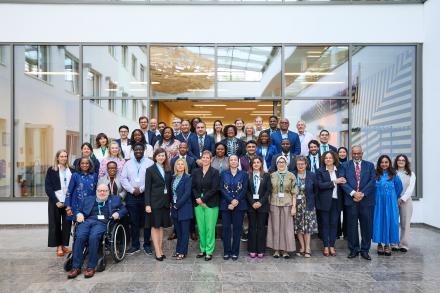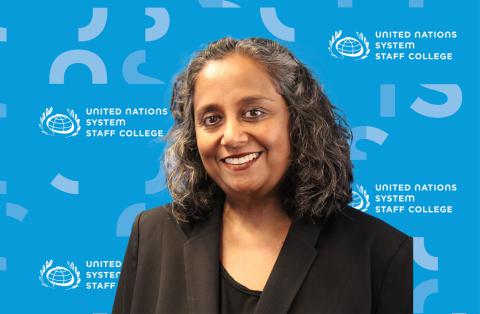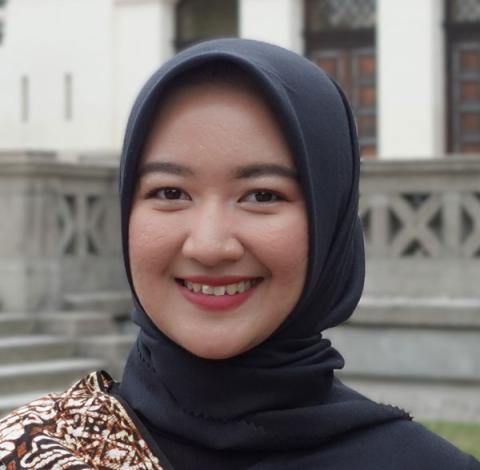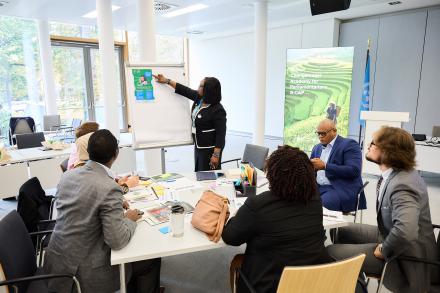
Bridging legislation and land restoration: The Global Changemaker Academy for Parliamentarians 2025
What if the very ground beneath our feet could speak?
Would it thank us for stewarding it with care or demand that we finally “clean up after ourselves before making another mess,” as Canadian Senator Paula Simons so vividly put it?
This question lay at the heart of the Global Changemaker Academy for Parliamentarians (G-CAP) 2025, held at the UN Campus in Bonn, Germany. Over five days, 29 parliamentarians from 29 countries exchanged stories, strategies, and struggles in a shared pursuit: turning the promise of sustainable land management by advancing bold ecosystem restoration legislation and unlocking the full potential of the restoration industry.
The academy, organized by the G20 Global Land Initiative under the UNCCD together with UNSSC, was a living laboratory of democracy in action, where politics met science, where cultural identity met climate urgency, and where individual legislators found collective resolve.

Insights from the parliamentarians
The richness of the programme came alive in the reflections of participants.
Hon. Cozier Frederick of Dominica spoke from the perspective of a small island state already facing the “onslaught of climate change through major weather events.” For him, land is not an abstract concept. It is food security, cultural heritage, and economic survival all in one. “Land gives us a sense of belonging and a sense of identity,” he reflected.
From the Caribbean to southern Africa, the sentiment resonated. Namibia’s youngest MP, Hon. Utaara Mootu, described land not as a passive resource but as “an important tool for development, for identity, and for unity.” She committed to using the academy’s insights to strengthen laws around gender justice, indigenous justice, and community-based resource management and ensuring that restoration benefits those most connected to the soil.
Across the Atlantic, Welsh parliamentarian Hon. Liz Saville Roberts reminded the group of her country’s own scars. “We have seen our land degraded through coal mines and quarries,” she said. “But in Welsh culture, “daear dir” which means “hold on to your land” is more than a phrase. It is a value. And we must ensure the future is only going to get better.”
For Hon. Juan Carlos Vargas of Colombia, the stakes are global. He linked deforestation in the Amazon directly to desertification, warning that once rare soil is gone, it may never come back. His parliament is already acting: “We created legislation for crimes against nature. Deforestation is now a crime.”
This spirit of legislative boldness ran through the entire academy. And yet, what made G-CAP transformative was not only the formal sessions with UN leaders and experts. As Hon. Paula Simons noted, “the most challenging things for my preconceptions came not from the presenters, but from my fellow parliamentarians.” Hon. Yuliia Ovchynnykova brought her dual perspective as both parliamentarian and environmentalist. reflecting on the green recovery challenges of Ukraine “Protect the land,” she urged, “and we protect life itself.”
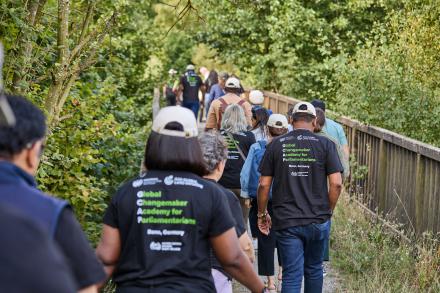
Innovation and Inclusion
The legislation sessions were a turning point, equipping MPs with a draft Model Law on Ecosystem Restoration and sparking debate on how to adapt it within their own national contexts. For some, this meant grappling with constitutional constraints; for others, it was an opportunity to align with ongoing reforms. What united them was a recognition that legislation is the bridge between global commitments and local change, which is the step that moves restoration from principle to practice.
The field visit to Eschweiler’s recultivated mining landscapes demonstrated how degraded land can be transformed into thriving ecosystems. For those unable to physically access the site, UNSSC introduced an immersive Virtual Reality learning experience.
Polish MP Hon. Jan Filip Libicki, a wheelchair user, described it as both meaningful and inspiring: “With minimal assistance, VR allowed me to experience the site visit fully. It showed me that restoration is not abstract but about people’s lives, their struggles, and their resilience.”
The VR experience is UNSSC’s commitment to inclusion, ensuring that every learner could fully engage in the Academy’s learning journey.
A shared truth and call to action
Each story and session revealed the same truth: land is not a partisan issue. Land is life. And parliamentarians, across ideologies and borders, hold the power to turn this vision into action.
As the G-CAP 2025 closed, the sense of urgency was palpable. This was not just about learning, but about forging a network of legislators committed to returning home with sharpened legislative and advocacy tools, fresh resolve, and a deeper connection to colleagues from every corner of the globe.
The question now is simple: what will you do with your mandate?
G-CAP 2026 will return, offering another generation of parliamentarians the chance to join this global community of changemakers. The land is waiting. Will you answer its call?
